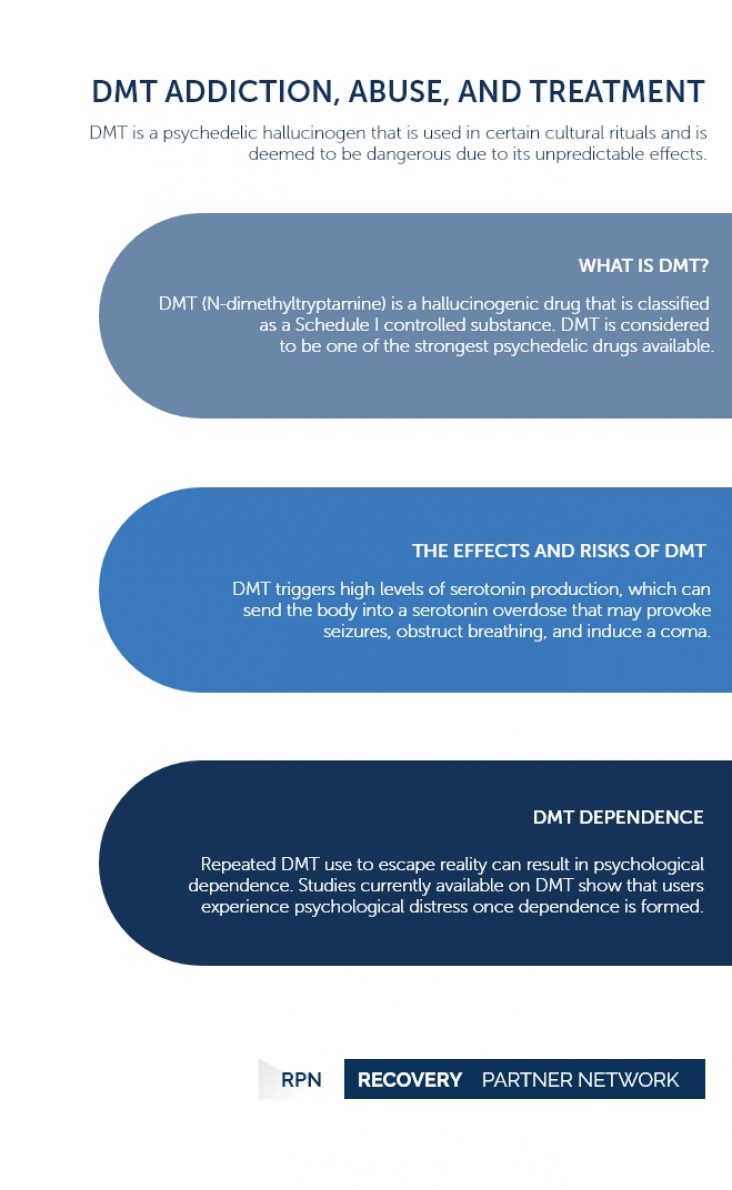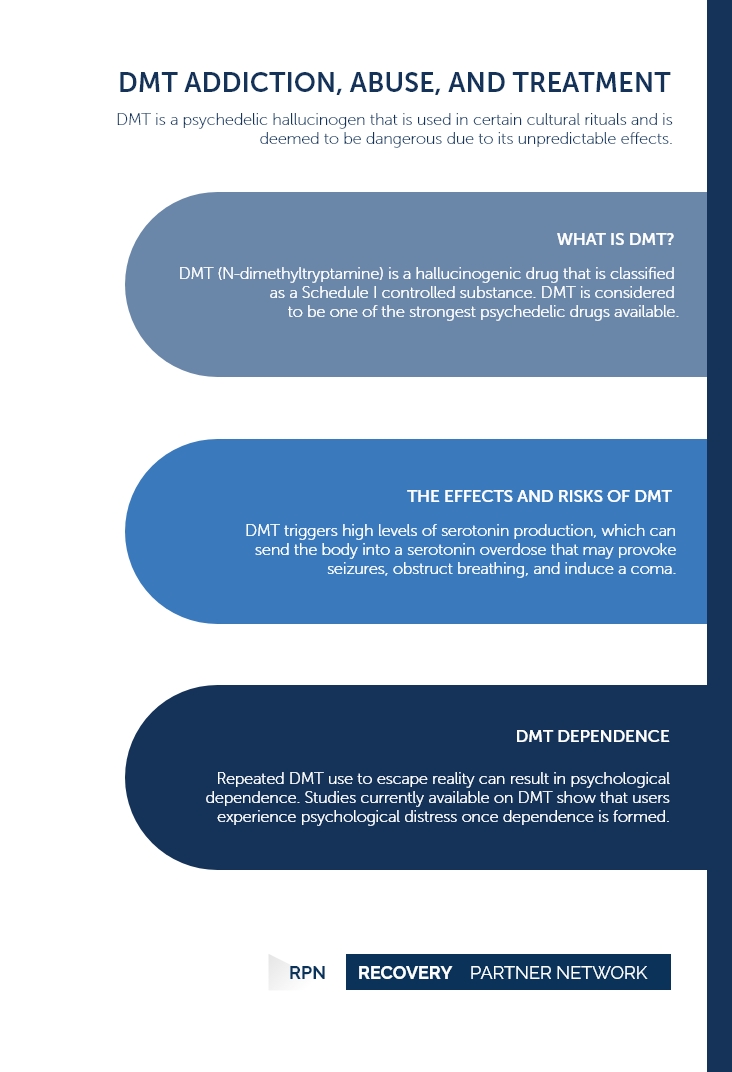DMT is a psychedelic hallucinogen that is used in certain cultural rituals and is deemed to be dangerous due to its unpredictable effects.
DMT Addiction, Abuse, and Treatment
Illicit drugs
- Ayahuasca addiction – Abuse
- Baclofen addiction
- Black tar heroin addiction
- Cannabis addiction
- Cocaine dependence
- Crack cocaine addiction
- DMT addiction abuse treatment
- Does Marijuana Kill Brain Cells?
- Ecstasy addiction
- Gabapentin addiction
- gamma-Hydroxybutyric acid addiction
- Hallucinogen
- Heroin addiction
- Illicit drug addiction
- Inhalant addiction
- Cocaine
- Ketamine addiction
- Lysergic acid diethylamide addiction
- Mescaline addiction
- Methamphetamine addiction
- Meth Labs: Cooking up Addiction
- Meth Mouth
- Microdosing
- Phencyclidine addiction
- Psilocybin mushroom addiction
- Sage of the diviners – Addiction
- Shooting Heroin
- Shooting Methamphetamine
- Smoking Cannabis
- Speedball
- Synthetic cannabinoids
DMT addiction abuse treatment | Table of Contents
What is DMT?
DMT stands for N-dimethyltryptamine, a chemical that occurs naturally in the brain and plants indigenous to South and Central America. DMT is a hallucinogenic drug that takes the form of white crystalline powder. It is typically smoked in a pipe or brewed into drinks such as ayahuasca and yagé to experience its effects. DMT users may also sometimes inject the drug, although this practice is less common.
Also referred to as Fantasia or Dimitri on the streets, DMT is one of the less-commonly used drugs in the US and around the world. DMT is considered as one of the strongest psychedelic drugs available. The drug was used in religious practices and rituals in certain cultures many years ago. Due to its potency, DMT was categorized as a Schedule I Substance under the Controlled Substance Act in 1971.
FAQ
- Is DMT physically addictive?
- What is the street name for DMT?
- What does DMT smell like?
- What is DMT meditation?
- What is Changa DMT?
- How can you tell if DMT is pure?
Unlike other drugs, DMT does not cause the build-up of tolerance or induce symptoms of withdrawal; hence DMT is considered a non-addictive substance.
Some of the street names are Fantasia, the spirit molecule, business man’s trip, or fourty-five minute trip.
DMT has a rather intense and peculiar smell and tastes that many have compared to burnt plastic and new shoes.
DMT meditation is a guide to channeling your endogenous DMT to discover the extraordinary abilities of humans that range from the physical, mental, and spiritual.
Changa is a DMT/MAOI-infused smoking blend. This blend includes extracts from DMT-containing plants and various herbs and ayahuasca vine and/or leaf to produce a mixture of 20–50 percent DMT. This substance is comparable to smoking ayahuasca.
Purified DMT is visually clear.
The Effects and Risks of DMT
DMT triggers the production of serotonin, a neurotransmitter that generates feelings of joy or happiness. DMT users experience euphoria, hallucinations, and altered perceptions of reality that they often characterize as life-changing.
When smoked, a DMT trip can occur instantly and last less than an hour. Users who drink DMT as a brew often experience hallucinations thirty minutes after consumption. These effects generally last for four to six hours, while some report of mild lingering effects that last for several days.
Some of the physical side-effects of DMT are:
- Dizziness
- Heightened body temperature
- Loss of muscle control
- Nausea and vomiting
- Pain or tightness in the chest
- Increased heart rate and hypertension
- Headache
- Rapid eye movement and dilated pupils
Although many users advocate the benefits of DMT, the drug is, in fact, unsafe. DMT can cause significant harm to a person’s physical health and mental wellbeing. Since DMT triggers high levels of serotonin production, it can also send the body into a serotonin overdose that may provoke seizures, obstruct breathing, and induce a coma.
While some DMT users have encountered positive psychological experiences with the drug, others have experienced terrifying and confusing hallucinations. In fact, the psychological effects of DMT can be traumatizing, particularly for individuals with mental illness such as schizophrenia.
FAQ
Also known as the DMT trance, this occurrence correlates with revelations. A DMT breakthrough refers to a very specific state within the DMT trip, which is obtainable through consuming adequate amounts of pure dimethyltryptamine.
Many plausible and yet untested theories indicate that endogenous DMT is generated in the human brain and is associated with some neuropsychological states. DMT exists naturally in small amounts in human cerebrospinal fluids, and other human and mammalian tissues.
The smoke produced by DMT can cause serious harm to the throat.
DMT Dependence
Unlike most hallucinogens, there is little evidence to prove that DMT causes tolerance or physical withdrawal symptoms. Therefore researchers do not believe DMT to be addictive. Research has also not yet uncovered evidence to indicate that prolonged consumption of DMT can significantly modify or damage a user’s brain. However, repeated DMT use to escape reality can result in psychological dependence.
Some DMT users consider the drug as a source of therapy and often consume it as a form of self-medication. When DMT is consumed in this manner, the users increase their chances of forming a dependence on the drug. The studies currently available on DMT dependence suggest that users experience psychological distress once dependence is formed.
Some of the behaviors that indicate DMT dependence are:
- Experiencing anxiety and depression if they are unable to use the drug
- Behavioral and personality changes
- Unexplained absence
DMT and the Law
DMT has been regarded as a Schedule I controlled substance since 1971. The US government considers DMT as a drug with no legitimate medical purpose and imposed heavy fines and jail time for the possession, manufacture, and sale of the drug. However, DMT is a significant part of several indigenous cultures in South America. Therefore, in 2006, the Supreme Court ruled that the federal government cannot prevent the use of DMT in religious and cultural rituals. Nevertheless, DMT remains illegal in most parts of America.
Recovery Partner Network
We aim to educate and empower. If you feel our library of resources does not cover your specific need, reach out to us, and we would be happy to help.
STATISTICS
© Copyright 2025


